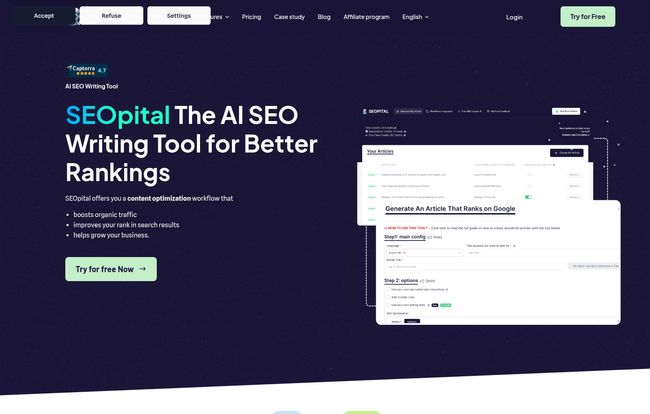If you’re in the SEO game, you know the grind. The content treadmill. It never, ever stops. You need more articles, better blog posts, and you needed them yesterday. For years, we’ve been promised that AI would be our salvation, the magical robot that would churn out perfect, rank-worthy content while we sip mojitos on a beach.
And what did we get? A flood of robotic, soulless text that reads like a car manual translated into Klingon and back again. Most AI writers, bless their hearts, just miss the point. They can string words together, sure. But they don't understand search intent. They don’t get the subtle art of crafting content that both Google and actual humans will love.
So, when I first heard about SEOpital, I was skeptical. Another one? Really? But the chatter was different this time. People I respect were saying it felt… different. So I rolled up my sleeves, pushed my cynicism aside (mostly), and decided to see for myself. This isn't a fluffy, sponsored-feeling post. This is my honest take on whether SEOpital is just another tool, or if it's the co-pilot we've been looking for.
So, What is SEOpital, Really?
Here's the first thing you need to get: SEOpital isn't just a content spinner with a fancy name. It pitches itself as a complete content optimization workflow. Think of it less as a ghostwriter and more as a super-smart research assistant and junior SEO all rolled into one.
The whole system is built around a simple but powerful four-step process:
- You feed it a keyword.
- It goes out and meticulously analyzes the top 10 results on Google for that keyword. It looks at everything—word count, headings, common questions, semantic keywords, you name it.
- It then generates a draft that’s built on that competitive analysis, designed from the ground up to match what's already working.
- Finally, it helps you track your rankings for the content you've created.
They make a big deal about generating E-E-A-T (Experience, Expertise, Authoritativeness, and Trustworthiness) friendly content, which is the holy grail since Google’s Helpful Content Updates started shaking things up. A bold claim, but the methodology at least makes sense. Instead of just guessing, it's making data-driven decisions based on the current SERP landscape. That, I can get behind.
The Features That Actually Matter to an SEO
A long feature list is great for a landing page, but I only care about what works and what saves me time. SEOpital has a few things that genuinely perked my ears up.
More Than Just a Word Generator
The core of the tool is, of course, the AI writer. But it has a few tricks. First, it's internet-connected. This is huge. It means it’s not working off a dusty, two-year-old dataset. It can pull fresh information, which is critical for timely topics. They also claim the output is "human-like and undetectable." I've tested a few articles, and while no AI is perfect, the output is leagues ahead of the generic stuff. It requires a lot less editing to get it to sound like a real person wrote it. You still need to do a pass, add your own voice, and fact-check. Don't ever skip that step. It's an assistant, not a replacement.
As a little bonus, it also has an image generation feature. Is it going to replace Midjourney? No. But for quickly creating a few decent, relevant blog images without leaving the platform, it’s a surprisingly handy time-saver.

Visit SEOpital
The Built-in SEO Toolkit
This is where SEOpital starts to separate from the pack. It's not just a writer; it’s a suite of tools that supports the writing process.
- Keyword Research and Clustering: I remember spending a whole weekend once just clustering keywords for a new client site. My eyes were burning. This tool does it in minutes, grouping your keyword lists into thematically related clusters. It's a fantastic starting point for building out a content strategy and creating those pillar pages and topic clusters Google loves so much.
- SERP Analysis: This is the engine under the hood. The fact that it analyzes the top competitors before writing a single word is the whole point. It’s reverse-engineering success.
- Rank Checker & Duplicate Content Checker: Are these groundbreaking? No, you can get them elsewhere. But having them integrated into your writing workflow is just… efficient. You can write, publish, and track your performance all in one place. It helps you spot keyword cannibalization too, which is a sneaky traffic killer for a lot of sites.
A Quick Walkthrough of the SEOpital Workflow
Let's make this tangible. Imagine you run a coffee blog and want to rank for "best manual coffee grinders."
You'd start by plugging that keyword into SEOpital. You could use its Keyword Clustering tool to find related terms like "burr vs blade grinder," "Hario Skerton Pro review," or "how to clean a manual grinder." Instantly, you have ideas for a whole series of articles.
Focusing on the main article, you'd tell SEOpital to get to work. It would scan the top 10 articles. It might find that the top-ranking posts are all over 2,500 words, include a buyer’s guide section, have an FAQ at the end, and mention specific brands like Comandante and 1Zpresso.
Armed with this data, its AI generates a draft. Not a blank page, but a structured article with headings, suggested keywords, and a word count that mirrors the competition. Your job is to come in and be the expert. You'll refine the prose, add your personal experiences with the grinders, correct any AI weirdness (it happens!), and inject your unique brand voice. After a final polish, you hit publish.
Then, you can add that URL to the Rank Checker and see how it starts to perform over the next few weeks. It’s a clean, logical process from start to finish.
Let's Talk Money: SEOpital Pricing
Okay, the big question. What does this cost? SEOpital runs on a subscription model, which seems fair for the value it provides. They have a few different tiers, which is nice because a solo blogger doesn't have the same needs as a large agency.
| Plan | Price/Month | Key Features |
|---|---|---|
| Basic | $49 | Generate 10 contents, Optimize 20 contents. Good for getting started. |
| Standard | $97 | Generate 25 contents, Optimize 50 contents. A solid choice for small businesses or prolific bloggers. |
| Expert | $149 | Generate 50 contents, Optimize 100 contents. Aimed at freelancers or small agencies. |
| Elite | $249 | Generate 100 contents, Optimize 200 contents. For power users and larger teams. |
Note: All plans seem to include the full suite of tools like Keyword Research, Rank Checker, etc. The main difference is the volume of content you can generate and optimize.
They also offer credit packs if you're project-based and don't want a recurring subscription. It's a flexible setup. You can find the full details on their pricing page.
My Final Verdict on SEOpital
So, is SEOpital the magic bullet? No. Because there's no such thing in SEO. But is it a damn good tool that can seriously speed up your content workflow and improve your results? Absolutely.
I went in skeptical, and I came out impressed. It’s one of the first AI tools I've seen that feels like it was designed by actual SEOs for actual SEOs. It understands that content creation isn't just about word count; it's about research, intent, structure, and optimization. It automates the tedious parts—the data gathering, the initial drafting—leaving you more time to do the high-value work: being the expert.
If you're still painstakingly researching SERPs by hand and then staring at a blinking cursor, you owe it to yourself to check it out. It might just be the co-pilot you've been waiting for.
Frequently Asked Questions about SEOpital
- Does Google penalize content made with SEOpital?
- This is the million-dollar question. Google's official stance, according to their own Search Central documentation, is that they reward high-quality content, regardless of how it's produced. Their focus is on helpful, reliable, people-first content. Because SEOpital's process is about creating well-researched, human-polished content, it aligns with these guidelines. The key is the 'human-polished' part. Don't just copy-paste.
- How is the content quality compared to ChatGPT?
- It's a different beast. ChatGPT is a general-purpose conversational AI. SEOpital is a specialist. Its entire model and workflow are fine-tuned for one purpose: creating SEO-optimized content. The output is more structured, better researched for SERP competition, and generally requires less work to get it blog-ready.
- Do I still need other SEO tools like Ahrefs or Semrush?
- For a comprehensive, site-wide technical audit or deep backlink analysis, you'll probably still want a powerhouse like Ahrefs or Semrush. SEOpital isn't designed to replace them entirely. It's built to be the best-in-class tool specifically for the content side of SEO—from ideation to writing and tracking.
- Can I use SEOpital if I'm a beginner?
- Yes, you can. The workflow is quite intuitive. However, I'd say you'll get the most out of it if you have a foundational understanding of SEO principles like keyword intent and on-page optimization. It makes a great assistant, but it helps if you know how to lead.
- What languages does SEOpital support?
- According to their site, they support multiple languages, including French, English, Italian, Spanish, and Portuguese. This is a great feature for anyone working on international SEO campaigns.
Reference and Sources
- SEOpital Official Website
- SEOpital Pricing Page
- Google Search Central: Creating Helpful, Reliable, People-First Content



